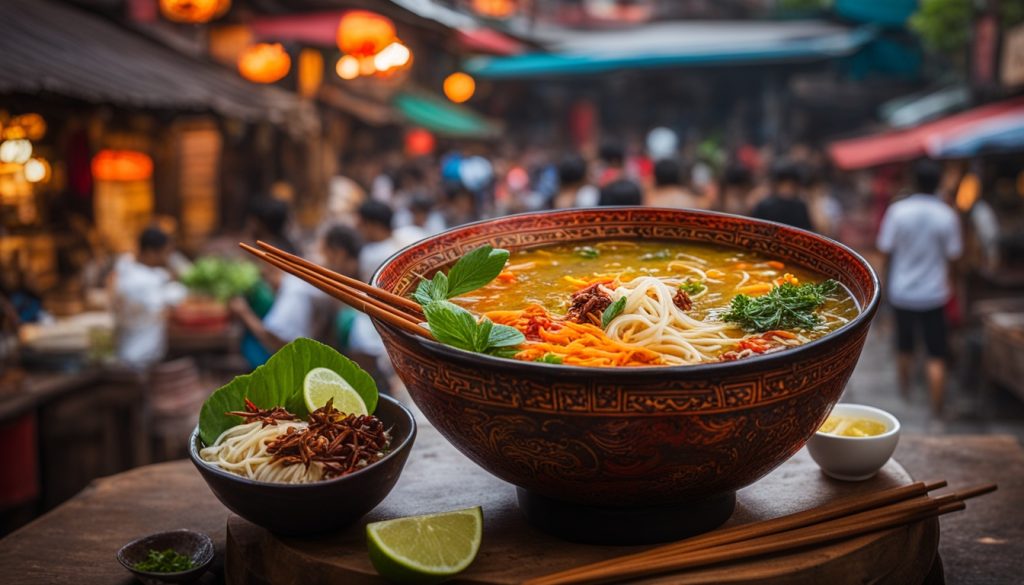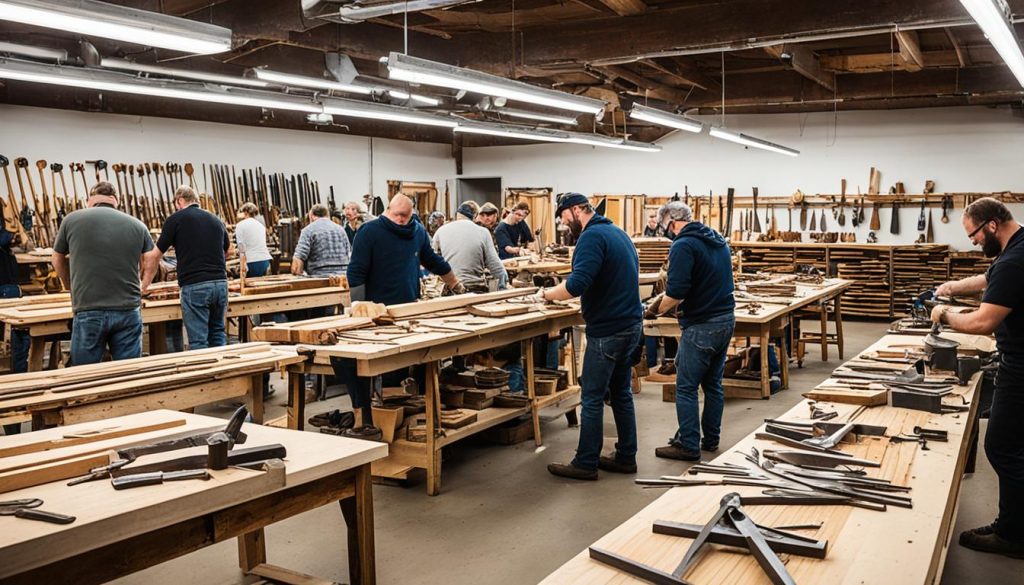Traveling to different cultures can help you grow and open new doors1. It’s about diving deep into the traditions and lives of other places. This kind of travel is all about people, history, and customs, not just sights. It makes you see beyond your own needs to truly get the local way of life.
You can try immersive local tours, visit indigenous communities, and taste ethnic foods. You can also join in on traditional crafts and see heritage sites. These experiences let you connect deeply with the culture.
Key Takeaways
- Immerse yourself in diverse cultures, traditions, and ways of life around the world
- Explore people, history, and customs beyond just tourist sites
- Discover immersive local tours, indigenous community visits, and ethnic cuisine
- Participate in traditional artisan workshops and heritage site tours
- Expand your perspective and appreciation for different lifestyles and beliefs
Immersive Cultural Tours
Explore Local Communities
Immersive cultural tours let travelers dive deep into local communities. They get to see the real life and learn from it2. These tours are guided by locals who share their knowledge and help connect with people2.
Visitors might see local homes, schools, or small shops. They can join in on community events and learn about the area’s history and traditions2. These tours help people from different cultures meet and understand each other better.
Being part of a cultural immersion means trying out real activities. You might cook, stay with locals, help out in the community, or go to local events3. It’s also cheaper than typical tourist trips3.
This kind of travel boosts the local economy by supporting guides, places to stay, and shops3.
Learning about different cultures means respecting their values and ways of life3. It helps clear up wrong ideas people might have about others3. You can find real cultural experiences by checking out new places with friends, family, or online groups3.
“Cultural immersion experiences impact participants’ view of self and others, influencing their re-entry into the local community.”3
Here’s a list of groups that offer cultural immersion trips. They include Transitions Abroad, Culture Explorers, The Experiment in International Living, G Adventures, Global Awareness Through Experience, Holbrook Travel, Intrepid Travel, Where There Be Dragons, and Wild Frontiers2.
Indigenous Community Visits
Visiting indigenous communities lets you dive into traditional ways of life and cultural heritage4. These visits help you appreciate the deep connection between indigenous peoples and the land4. You might see or join in ceremonies, crafts, or activities that have been done for generations4.
In the last ten years, indigenous-led tourism has grown a lot, thanks to support from tourism groups4. There are many options for travelers around the world4. Sites like NativeAmerica.travel, Destination Indigenous, and Discover Aboriginal Experiences help you find real indigenous tourism in the U.S., Canada, and Australia4.
These tourism efforts help the local people and are key to keeping cultures alive and teaching others4. Visitors learn from indigenous communities, clearing up wrong ideas and understanding their heritage better4. These trips also support people like guides and artists, helping keep traditions alive4.
“Indigenous tourism plays a vital role in cultural preservation and education, offering visitors an opportunity to learn directly from Indigenous communities and correct misconceptions.”
Indigenous tourism is important worldwide, with plans like Canada’s federal tourism strategy5. This plan plans to spend CAD 25 billion on indigenous tourism, aiming to boost the economy by 40% and create 85,000 jobs by 20305. This shows how crucial indigenous tourism is for keeping cultures alive, helping the economy, and empowering communities5.
The Manito Ahbee powwow in Canada celebrates indigenous culture with dance and inspiration5. The National Indigenous Residential School Museum of Canada tells the story of the past5. These experiences connect the past and present, helping with healing and understanding5. They give travelers a chance to connect with and support indigenous communities5.
Ethnic Cuisine Exploration
Trying out the diverse foods of a place is a great way to connect with its culture6. By tasting local dishes and street food, you learn about the area’s history and traditions7. You might even join cooking classes or eat with local families, deepening your understanding of their food culture6.
This lets you form bonds with locals and see how food is central to their lives and identity6.
The popularity of ethnic food is growing thanks to more diverse cities7. Ethnic restaurants and food trucks now attract not just immigrants but also those looking for new tastes7. Traveling to new places also makes people want to try those dishes at home or in their local areas7.
To dive into ethnic cuisine, learning about key ingredients and spices is key6. It’s important to have chefs who know their stuff to make dishes taste right6. Mixing international and local flavors in new dishes can attract more customers6. Sharing the stories behind the dishes makes dining more educational and fun6.
Social media and food blogs help spread the word about tasty ethnic dishes7. By catering to different diets and listening to customers, places can offer a great food experience6. Embracing ethnic cuisine makes our food scene more diverse and exciting, mixing old and new flavors7.

“Exploring ethnic cuisine is not just about tasting new flavors, but also understanding the cultural traditions and stories behind the food.”
Traditional Artisan Workshops
Dive into Japan’s rich cultural world with traditional artisan workshops. These experiences let you learn and help keep local crafts alive. You can see and even make handmade items with expert artisans8.
Japan is full of unique crafts, each with its own style. In Okinawa, learn about Yachimun pottery. In Gunma, make your own Daruma figurines, symbols of luck and new starts8.
These workshops show you the deep meaning and making of traditional crafts. They also help support artisans through tourism9. By joining, you help keep these traditions alive for the future9.
| Craft | Region | Highlights |
|---|---|---|
| Kutani Ware Porcelain | Ishikawa | Experienced potters guide visitors in creating unique porcelain pieces8. |
| Gold Leaf Craftsmanship | Kanazawa | Artisans work with gold leaf that is only 1/10,000th of a millimeter thick8. |
| Yachimun Pottery | Okinawa | Visitors can participate in pottery-making classes within the charming streets of Yachimun-dori in Naha8. |
| Daruma Figurines | Gunma | Travelers can create their own Daruma figurines, a symbol of good luck and new beginnings8. |
| Mino-style Sword Making | Gifu | The Seki Swordsmith Museum offers insights into the fine craftsmanship of Japanese swords8. |
Japan has many workshops and events for you to try. Learn about Taiko drum making, indigo dyeing, and bizen-yaki ceramics8. These experiences deepen your understanding of art and connect you with local artisans9.
“Artisanal tourism provides economic opportunities and empowerment for artisans and their communities, contributing to the preservation of traditional craftsmanship for future generations.”9
Explore Japan’s traditional artisan workshops and enrich your cultural journey10. See the beauty and importance of these crafts. Support artisans and their communities through sustainable tourism9.

cultural travel experiences
Travel lets you dive deep into local communities, traditions, and ways of life11. You can join in on local festivals, stay in rural homestays, or take part in exchange programs. These activities let you connect with the true spirit of a place11.
Activities like tango lessons, football games, and cultural tours show a growing interest in diving into local cultures11. Places like Bhutan even require a guide to protect their culture and support sustainable tourism11. Cultural travel opens a door to a world full of diversity, from Tbilisi’s art cafes to Paris’s sidewalk cafes11.
Cultural travel has many benefits12. In a survey, most travelers chose cultural experiences over typical tourist activities. They also gained a deeper understanding and appreciation of different cultures12. Independent travelers spent less and felt more connected to the communities they visited12. By diving into local customs and supporting local initiatives, you help preserve cultural heritage and support sustainable tourism12.
Whether it’s learning tango in Buenos Aires, watching a football game, or exploring Provence’s markets, cultural travel changes how you see the world11. It’s a journey that celebrates diversity, broadens your views, and deepens your global understanding and empathy11.
| Cultural Experiences | Destination |
|---|---|
| Tango lessons | Buenos Aires |
| Attending a rivalry football game | Buenos Aires |
| Exploring Bhutan with an official guide | Bhutan |
| Spending time at Ipanema Beach | Rio de Janeiro |
| Walking tour of the Rocinha favela | Brazil |
| Experiencing Canada’s bohemian culture | West Coast, Canada |
| Visiting the Calgary Stampede | Canada |
| Discovering converted apartment bars | Beijing |
| Enjoying a sauna on the sea | Finland |
| Shopping in local markets | Provence |
| Sipping aperitifs at a sidewalk cafe | Paris |
| Experiencing art cafe culture and thermal baths | Tbilisi, Georgia |
Heritage Site Tours
Step back in time with heritage site tours. These tours take you to the world’s most captivating places. You’ll see Malta, Berlin, Spain, Naples, Vietnam, Poland, Germany, Finland, and the Western Front13.
Experts lead these tours, sharing the history and culture of these places. They cover wars, archaeological sites, and the rise and fall of empires13.
These tours let you dive into the past through stories and landmarks. They last from 5 to 8 days, giving you time to soak in the history13.
These tours are more than just fun; they help preserve our cultural heritage for the future13. You’ll leave with a deeper love for human history and culture.
Explore the World’s UNESCO World Heritage Sites
See the beauty and history of UNESCO World Heritage sites. Visit ancient Pompeii and Holocaust memorials in Poland. These tours show you the world’s history13.
These tours are not just educational. They let you connect with local traditions and culture. You’ll enjoy the art, food, and traditions of these places14.
They’re perfect for history buffs or anyone wanting a meaningful trip. You’ll learn, explore, and immerse yourself in culture. Start a journey that will spark your curiosity and respect for our past14.
“Heritage tourism allows us to forge deep historical connections, sparking a sense of wonder and respect for the past that can truly transform the way we see the world.”
– Lance Still, Senior Vice President of Consumer Enterprises, A+E Networks
Conclusion
Cultural travel changes how you see the world and your role in it15. By venturing beyond what’s familiar, you dive into local customs and traditions. This helps you appreciate human diversity and feel more connected to the world15. Such experiences widen your views, help you grow personally, and support local communities through sustainable tourism15.
Exploring indigenous cultures, tasting local foods, or learning traditional crafts makes for a rewarding journey15. A survey found 75% of travelers seek out cultural experiences on their trips16. The cultural travel market has grown by 5% each year for the last five years16. This shows how crucial these experiences are for understanding different cultures and personal growth16.
When you travel culturally, you learn to value the world’s diversity and help local communities15. Cultural travelers often give more to local economies than regular tourists16. This underlines the positive effects of sustainable cultural tourism16. So, let cultural travel broaden your horizons, deepen your connections, and make you a global citizen17.
FAQ
What are the key features of cultural travel experiences?
Cultural travel lets you dive into the rich cultures, traditions, and lifestyles of different places. It’s about connecting with people, history, and customs, not just tourist spots. You get to see the real ways of life and traditions of local communities.
What are the benefits of participating in immersive cultural tours?
Immersive cultural tours let you really connect with local communities. You learn from guides who know the area well. You might visit homes, schools, or small businesses, join in community events, and learn about the area’s history and traditions. This promotes understanding and exchange between cultures.
What can I expect from visiting indigenous communities?
Visiting indigenous communities is a chance to learn about their traditions and way of life. You’ll appreciate their cultural heritage and how they care for the land. You might see or join in traditional ceremonies, crafts, or activities that have been passed down for generations.
How can exploring ethnic cuisine immerse me in the local culture?
Trying local dishes and street food gives you a peek into the area’s history and ingredients. You might cook with locals, visit markets, or eat with families. This helps you understand how food shapes culture and daily life.
What can I learn from participating in traditional artisan workshops?
In traditional artisan workshops, you learn about preserving local crafts and art. You might make things like textiles, ceramics, or woodcarvings with experts. This lets you see the importance of these crafts and how they’re made.
What other cultural travel experiences are available?
Cultural travel can include many things, like going to festivals, staying in rural areas, or joining exchange programs. These experiences let you live like locals and understand their traditions, values, and daily life.
What can I expect from heritage site tours?
Heritage site tours take you through the history and cultural importance of a place. You’ll see landmarks, ruins, or architectural wonders and learn about the people and events that shaped them. These tours help keep these places alive for future generations.

